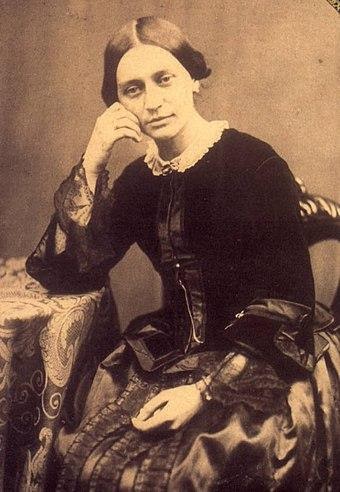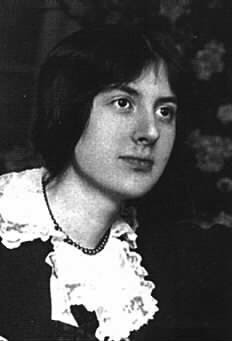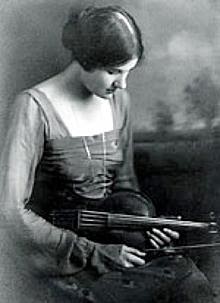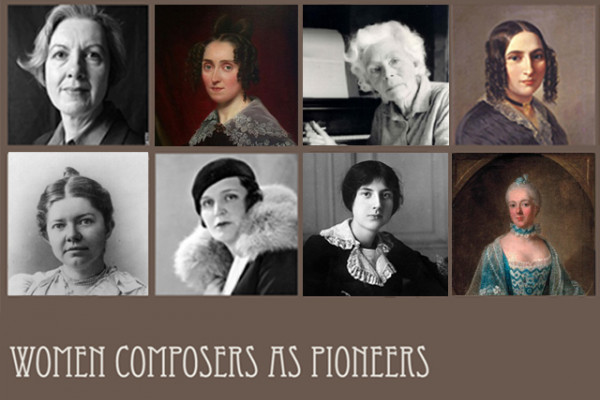Clara Schumann – "surely you mean Robert?". This was the reaction last September 2019, when the bicentenary of the birth of Clara Wieck Schumann elicited a revival of her piano music and other works, and a spate of new recordings.
Although many a music listener will have heard of the legendary abbess Hildegard von Bingen, a gifted composer of church music around 1100 A.D., women composers from then until the 20th Century seem to have fallen into a "black hole" of obscurity.
Christine ten Bokum, our speaker, will acquaint us with equally talented composers and highlight the circumstances of this glaring lack of recognition. We will encounter Belle van Zuylen, Louise Ferranc, Fanny Mendelssohn, Alma Mahler (or did I mean Gustav?), Lili Boulanger, Amy Beach, Cecile Chaminade, Germaine Tailleferre, Elisabeth Maconchy, Judith Weir and Sofia Gubaidulina … not forgetting the pioneering achievements of Clara Schumann herself. The big question – is male hegemony still in sway today?
Christine ten Bokum grew up in Zimbabwe, where she obtained her Licentiates in Piano Teaching. After moving to Holland with her young family, she pursued further studies in piano and harpsichord. She subsequently performed with the Telemann Ensemble, a baroque group, accompanied adult and children's church choirs, and taught piano privately.
After relocating to Brussels with her husband, she resumed piano teaching, playing in chamber music ensembles and accompanying singing students and examination candidates.
She hosts twice-yearly Associated Board examination sessions at her studio in Tervuren, and a monthly Music Appreciation group for members of WIC
Note: Content and images not intended for copyright infringement.

Last week members of ISG had the pleasure of hearing a talk by Christine ten Bokum, a professional musician and teacher, on the subject of “women composers, whose names have either been forgotten or who have lacked recognition until well into the 20th century”.
Christine illustrated the points in her lecture with selected pieces of music. The technical side was supported by Angela Oestmann, a member of our Board.
Christine included in her lecture the stories of eight women composers coming from Germany, France, England, Ireland and the United States. They are Clara Schumann, Fanny Mendelssohn, Cecile Chaminade, Rebecca Clark, Amy Beach, Ethel Smyth, Lili Boulanger and Elisabeth Maconchy.
These women were all talented and they were determined to become professional musicians and performers. How their lives turned out, though, is a different story. Unfortunately, nowadays there is practically no chance to hear the works by these composers in concerts. Why?
Christine ten Bokum tried to answer this question, pointing to their family situations, their struggle for recognition and their music.
Firstly, we have to consider their education, which has common features. They all were coming from musical families. Their parents were either professional musicians or gifted amateurs. Thus, they received their first lessons within their families. Later on, they continued their education at music academies, except for the European forerunners, Fanny Mendelssohn and Clara Schumann. Both possessed outstanding talents, which were recognized by their families and they were educated within the families. Nevertheless, their fates were different.

Fanny Mendelssohn came from the well-to-do bourgeoise family, lived under the shadow of her brother, the renowned composer Felix Mendelssohn, who even published her pieces under his own name. She could perform mainly at home and not in public. Eventually she decided to do a public performance but died soon after. The tension was too much for her. Curiously, her brother
died a few months after her. Both were in their early 40s. Her legacy consists of a collection of smaller pieces for piano and songs.
Clara Schumann was different. From an early age, she became a professional performer, travelling around Europe and giving piano recitals. She won an award from the Austrian court for her virtuosity at the age of 18 and was invited to join the orchestra. Her father was a well-known teacher and prepared his daughter for a professional career, which lasted 60 years.
Another interesting feature is that these women composers (except for Fanny) were making a living by their performances while at the same time they composed on the side. The French composer Lili Boulanger is an interesting example. She was the first women to receive the Prix de Rome for a composition and that led to a contract with the Ricordi publishing house who put her pieces on sale. Her death at the age of 25 stopped everything. She left behind songs, short piano pieces and her cantata ‘Faust and Hélène’ as well as an unfinished opera ‘La Princesse Maleine’. If this opera had been completed and performed, who knows, maybe her name would be as famous as George Bizet’s.
It was already another century and different times. Talented women were being educated at the conservatories. They got professional and personal satisfaction. They moved from salon playing to the concert halls.

The French composer and pianist Cécile Chaminade was among the most successful. She created concerts for flute and piano, wrote operas and ballets, and in 1913, she was given the Ordre du Chevalier by the French Government. She created 400 compositions of which her concerto for flute and piano remains the most popular. It is still performed.
The Irish-English composer Elizabeth Maconchy was not only successful, but also the most prolific. In 1939 she wrote a piano concerto which has become very popular. She received a professional musical education. Though she married and had children, this did not stop her writing music, which attracted an audience by being deeply lyrical.
Altogether, between 1932 and 1989 she created 14 string quartets. In 1980, nine years before her death, she was made Master of the Queen’s Music.
Now the question is why they were not recognized? My answer is simple: none composed big pieces. In spite of their studies in conservatories, they continued creating small and short pieces and often their entire opus was not large. For example, if we take Franz Joseph Haydn, his legacy is 104 symphonies, 83 quartets, more than 24 operas, 52 piano sonatas and many other things. How can you overlook such a composer? Similarly, Johannes Brahms was equally productive.
Among these women, the most published was British composer Ethel Smyth, who wrote many pieces, including operas. Her music was performed in London, her operas were staged around Germany, in Berlin and Leipzig. Her opera ‘Der Wald’ in 1903 was performed at the Met in New York and in 1934 she had a concert at the Royal Albert Hall in London in the presence of the Queen, who conferred on her the title of Dame Ethel Smyth, the first time this title was given to a composer.
The English composer and performer Rebecca Clarke played violin and viola and wrote for viola. Her quartets, sonatas for viola and piano are still performed, but not often. Her total output is not large, consisting of 52 psalms, 11 choral works, the piano trio and the violin sonata. If she had composed a symphony or a concerto, her professional life would have been more significant, and her name would be more famous.
For male composers who wanted to become professional musicians or composers, life was not easy either, with the exception of those coming from well-do-to and supportive families, like Mendelssohn and the French composer Giacomo Meyerbeer.
Probably these women’s talents were not up to the hard conditions of the world or they did not have enough determination.
Certainly, there were other reasons which could frighten women away from doing big pieces. Salon music requires a piano or a violin or any other single instrument like the viola de gamba. It is not hard to organize it. But to perform a concerto or an opera, you need an orchestra, a concert hall, or a theatre. It is very expensive and virtually impossible to find sponsors for such projects. And not only for a woman. Remember the struggle of Richard Wagner when he tried to stage his early operas.
Looking at their biographies, I am surprised how many of them had professional careers, how many gave solo concerts and went on world tours and published their works while trying to combine this with having husbands and raising families. Closer to our times some even got official positions. For example, the American composer Amy Beach after she stopped performing and writing music, served as President of the Board of Counsellors of the New England Conservatory of Music.
As for the question why, their works are not performed now, we should put it to the organizers of the concerts or performers. For example, Rebecca Clarke introduced the viola as a concert instrument and wrote music for it. Even today viola does not have a big repertoire. It would be good to include in concerts pieces by Rebecca Clarke. Or by other women-composers? But organizers are often afraid of irritating the public and continue encouraging orchestras to perform the same classic repertoire. Unfortunately, they underestimate the public, who are more advanced and curious than they think.
The latest issue of the online music magazine ‘Crescendo’ published an article on the same subject. Two French performers Juliette Hurel and Hélène Couvert in July of the last year recorded a program consisting of works by female composers and called it ‘Compositrices à l’aube du 20ième siècle’. It consists of pieces for piano and for flute and piano. Among the six female composers we find the names of Lili Boulanger and Cécile Chaminade. The article refers to their pieces as “jewels of delicate poetry and endless tenderness.”

